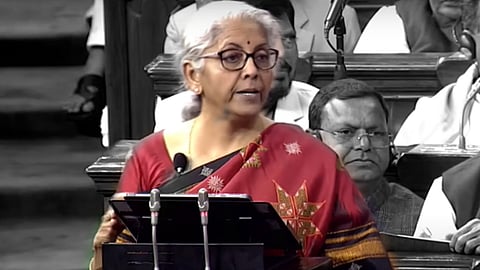
- News
- Columns
- Interviews
- Law Firms
- Apprentice Lawyer
- Legal Jobs
- हिंदी
- ಕನ್ನಡ

The Union Budget, 2023, was tabled by Finance Minister Nirmala Sitharaman in Parliament on Wednesday, February 1, 2023. The Budget envisages important steps in the field of dispute resolution. The measures in the Budget in relation to disputes are a clear indication of the Government’s intent to reduce the burden of pending proceedings in Court, make access to justice easier and inexpensive, increase the faith of investors in arbitration as a dispute resolution mechanism and change the reputation of the Government as the biggest litigant in India. The Government also appears to be intent to take a common-sense approach to litigation – providing for a voluntary settlement scheme (presumably for disputes under a particular value as also those pending for a long duration to avoid costs of litigating such cases and also reducing the burden on Courts). In this article, we set out some important developments and analyse their impact on the disputes landscape in India.
The Government, in line with its earlier steps to create a more sound and predictable litigation system and to reduce the pendency of litigation, introduced two crucial legislative reforms in its Vivad Se Vishwas initiative.
The earlier eponymous initiative under this was an amnesty scheme which allowed a party to pay any disputed taxes to avoid penalties, interest and any future prosecution for such liability.
In a populous initiative - the Budget in order to provide relief to micro, small and medium enterprises, who were affected during the Covid-19 pandemic, has made a provision for the return of 95% of any forfeited amount relating to bid or performance security, by government and government undertakings, in cases where the MSMEs failed to execute contracts during the Covid-19 period.
Covid-19 was a particularly difficult time for small enterprises. As MSMEs were unable to meet their obligations in respect of government tenders and agreements, there were multiple instances of forfeiture of bid or performance security, which in turn resulted in the judiciary being burdened with multiple disputes challenging such forfeiture. The present provision of the Budget would ensure that litigation filed by MSMEs pursuant to such forfeiture would be withdrawn and all such disputes would be resolved without any further reference to Courts. This not only reduces the pendency of cases before Courts but also provides certainty in respect of disputes of similar nature that arose during the Covid-19 pandemic. This would also save the taxpayer’s money that would have otherwise been used by the government or government undertakings in defending such disputes.
This Budget, in line with the Budget of 2022 (which provided for setting up of an International Arbitration Centre at the GIFT City, Gujarat, for quick disposal of disputes), has introduced provisions which aim at improving faith in the ADR landscape of India by providing more predictability to long drawn arbitration disputes.
The Budget has made an important provision that allows government and government undertakings to settle contractual disputes, where the arbitral award is under challenge in a court, by way of a voluntary settlement scheme with standardised terms. This will be done by offering graded settlement terms depending on the pendency level of the dispute. The details of this scheme may be available in the coming days. The scheme may provide for settlement depending on the number of years and the level of the Court at which the matter is pending. This is a welcome move as it creates a channel for the Government, government undertaking and other involved parties to settle long-standing disputes.
This also strengthens the sanctity of an arbitral award and is a step towards resolving disputes through alternate mechanisms. The Government is the biggest litigant in India. More often than not, disputes against the Government go through multiple rounds by way of appeals and irrespective of the Government being at fault, a large amount of the taxpayer’s money is used in fighting these disputes. It goes without saying that such multiple rounds of litigation result in a huge burden on the Courts. Therefore, the introduction of a voluntary settlement scheme with standardised terms would promote resolution of disputes. It also makes the Government appear reasonable in closing cases which are pointless to pursue on merits. Courts can invest time in adjudicating cases which require attention and focus on reducing the backlog, which, in any event, remains a goal.
The Budget has also made provisions for launching Phase-3 of the E-courts project with an outlay of INR 7,000 crores. The E-Courts project was originally introduced in 2007 (Phase -1), with an aim to incorporate technology in the existing legal system at the District/Taluka Court level to ensure efficient administration of justice and better access to litigants. Thereafter, Phase-2 of the project was approved in 2015, which further improved access to justice. Some of the crucial achievements of Phase-2 were Covid management software, National Judicial Data Grid, virtual courts, e-filing and digitisation of records. Phase-3 of the project aims at making the system more inclusive and user focused. This is in line with the constant push from the Apex Court to move the judicial process to a paperless mechanism and increase access to justice.
Given the peculiarities of the arbitration process as provided under the SEZ Act, the Budget also appears to correct this by suggesting that provisions of the IFSCA Act will be amended to provide for arbitration. It also states that powers under the SEZ Act will be centralized to the IFSCA itself so as to avoid a multiplicity of authorities.
It remains to be seen if these provisions are swiftly introduced to ensure that the implementation of these provisions is in line with the expectations of what these schemes have set out to achieve – speed, transparency, reduction of backlog, efficacy, stability and reasonableness.
Shalaka Patil is a Partner and Ankit Pathak is an Associate at Trilegal.